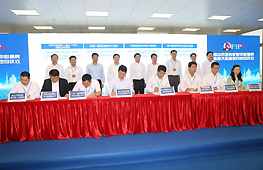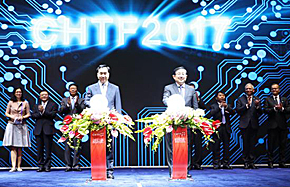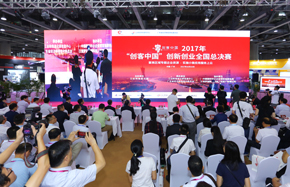Workshop on China-EU Innovation and Competition held at Tongji
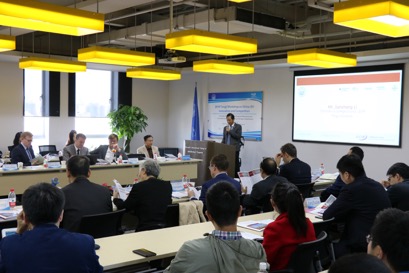 |
|
Li Jianchang, Party secretary of SICIP, delivers a welcome speech. [Photo/tongji.edu.cn] |
The Workshop on China-EU Innovation and Competition was held at Shanghai International College of Intellectual Property (SICIP) of Tongji University, on Oct 26.
Senior officials and scholars from the University of Munich, University of Zurich, State High Court of Justice, Karlsruhe, Chinese Academy of Social Sciences, Shanghai High People’s Court, KEIS Law firm, Dentons law firm and Fangda law firm were invited to participate in the workshop, the theme of which was “Ten Years’ Enforcement of Chinese Anti-Monopoly Law & Innovation and Competition Policy in the Age of Digitalization”.
Li Jianchang, Party secretary of SICIP, delivered a welcome speech. Peter Ganea, deputy director of the Sino-German International Economic Law Institute at Tongji University, was the moderator for the first session of the workshop.
Wang Xiaoye, a professor of the Chinese Academy of Social Sciences, delivered a speech titled “Ten Years of Chinese Anti-Monopoly Law: Achievements and Challenges”, which introduced the development of Chinese legislation and future challenges.
Thomas Ackermann, professor of the University of Munich gave a lecture titled “Digital platforms as a challenge to antitrust: Insights from EU and German competition law”. In his lecture, he put forward several newly-emerging competition-related issues in the context of a digitalized platform.
Peter Georg Picht, professor of the University of Zurich delivered a speech titled “Competition Law for the Digital Era - a Selection of Topics and Challenges”. He mentioned that the digital era brought about more complicated cases which were sometimes difficult to judge whether competition law applied.
During the Q&A session, participants discussed methods to deal with the new cases emerging from the age of digitalization.
The second session of the workshop discussed effective enforcement of competition law, which was moderated by Yu Xinmiao, associate professor at SICIP. Carsten Lembach, judge from the Higher Regional Court of Karlsruhe gave a speech titled “Private enforcement of competition law - - Quantification of harm in antitrust damages actions”.
He argued that economic evidence can be applied to prove the amount of damage and the lump sum can represent a genuine pre-estimate of damages. Judge Kong Liming from the Shanghai Higher People's Court gave a report on recent judicial developments in China in competition law, focusing on the legal protection of trade secrets and the anti-trust review of DOE.
Professor Xiao Yukun from the University of Munich, gave a speech titled “Private Enforcement of China’s Anti-Monopoly Law - - a Decade in Review”. Through the study of judicial practice cases over the past decade, Xiao analyzed the unsolved issues of the existing legal framework in details. During the following Q&A session, the participants discussed the future of private enforcement of antitrust law.
Professor Shan Xiaoguang moderated the third session of the workshop. At first, Matthias Leistner, professor from the University of Munich, gave a lecture on copyright liability of online-content-platforms and recent developments in case law and legislation in Europe, which was about the fundamental alternatives to fairly remunerating authors on the internet.
Yang Hong, an associate professor from SICIP, delivered a speech on protecting independent elements of works under copyright law and competition law. To illustrate his point, Yang gave an example of the Yong Jin vs. Nan Jiang case to explicate China’s recent practices on this issue.
Zeng Caixia, who comes from Tongji University, made a speech concerning the effect of the right to data portability in a big data monopoly, under the background of the recently-released GDPR document.
She also shared her views on experiences that China can learn from. In the Q&A part, Matthias Leisner and Peter Ganea raised some in-depth questions on Zeng’s speech, discussing the current data protection of individuals in China.
The last session of the forum was themed on the effective enforcement of competition law from the perspective of a company. This part was moderated by Professor Liu Xiaohai.
Donato Nitti from KEIS Law Firm, focusing on artificial intelligence, discussed the question of whether the creation of AI can be treated as intellectual property, qualifying it to receive judicial protection.
Dai Jianmin, partner of Dentons, talked about a famous case (“Cainiao” Data Standoff) and then gave a speech about big data and competition in China from a practitioner’s perspective. She Yifeng, partner of Fangda Partners, compared two similar cases and then he put forward his opinions on the standard essential patent litigation.
At last, Xu Xiaofeng from Tongji University, gave a speech titled “China-EU Cooperation and Identification of Restrictive Agreements”, in which some defects and suggestions to improve the anti-monopoly Law of the PRC were introduced.
During the Workshop, on behalf of the Law School at the University of Munich and SICIP at Tongji University, Thomas Ackermann and Shan Xiaoguang, signed a cooperation agreement.
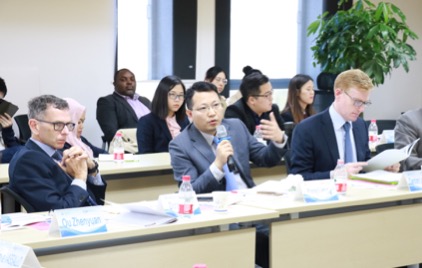 |
|
Kong Liming (M), judge at Shanghai High People’s Court, speaks at the workshop. [Photo/tongji.edu.cn] |
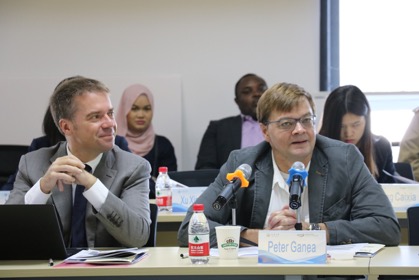 |
|
Peter Ganea (R), deputy director of the Sino-German International Economic Law Institute at Tongji University, speaks at the event. [Photo/tongji.edu.cn] |
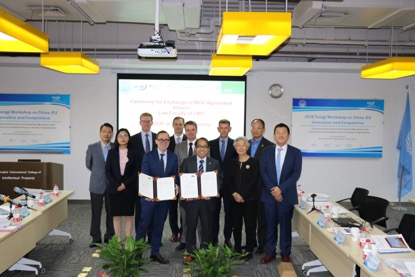 |
|
Thomas Ackermann (front row, second from left) and Shan Xiaoguang, sign a cooperation agreement, on behalf of their respective sides. [Photo/tongji.edu.cn] |









